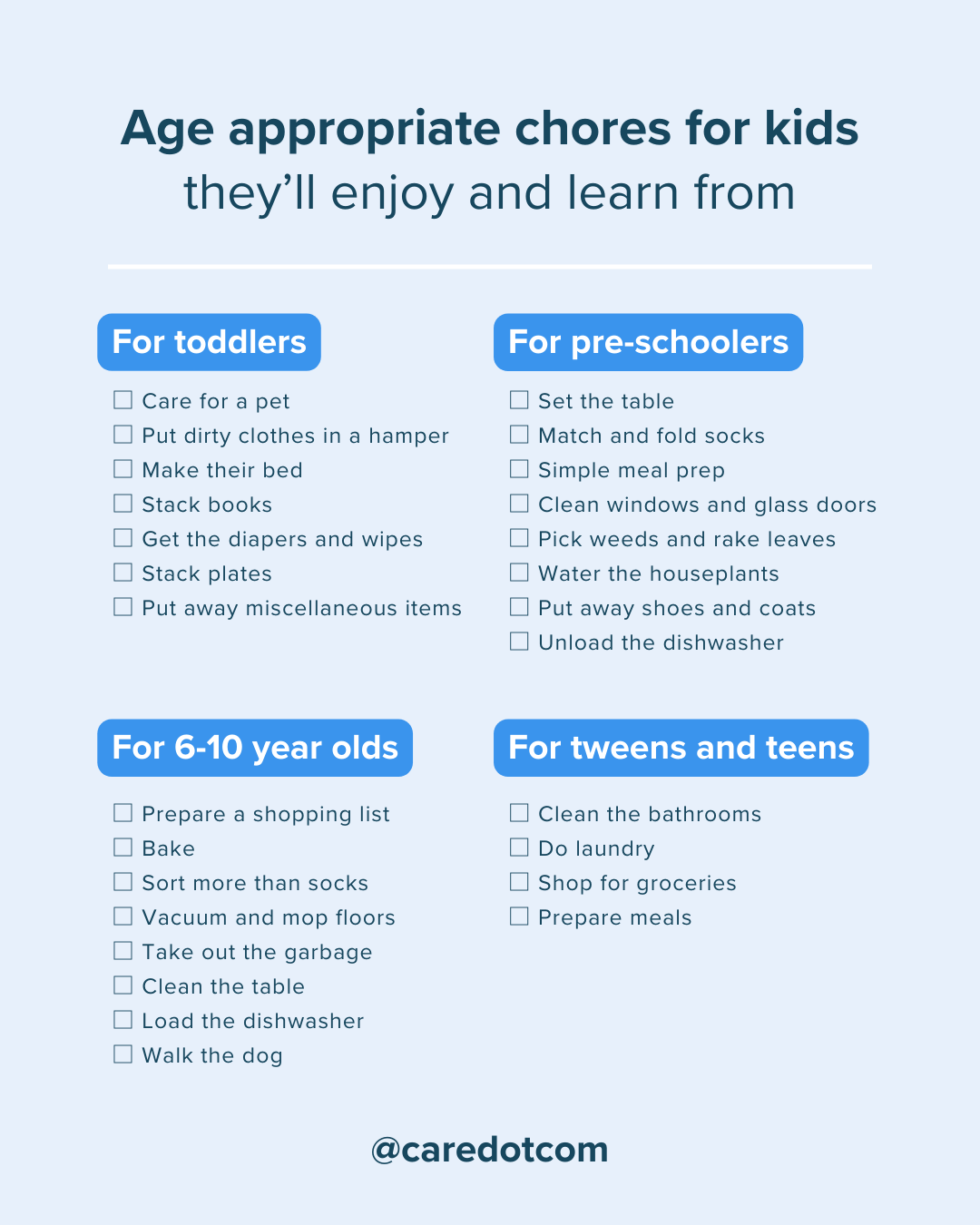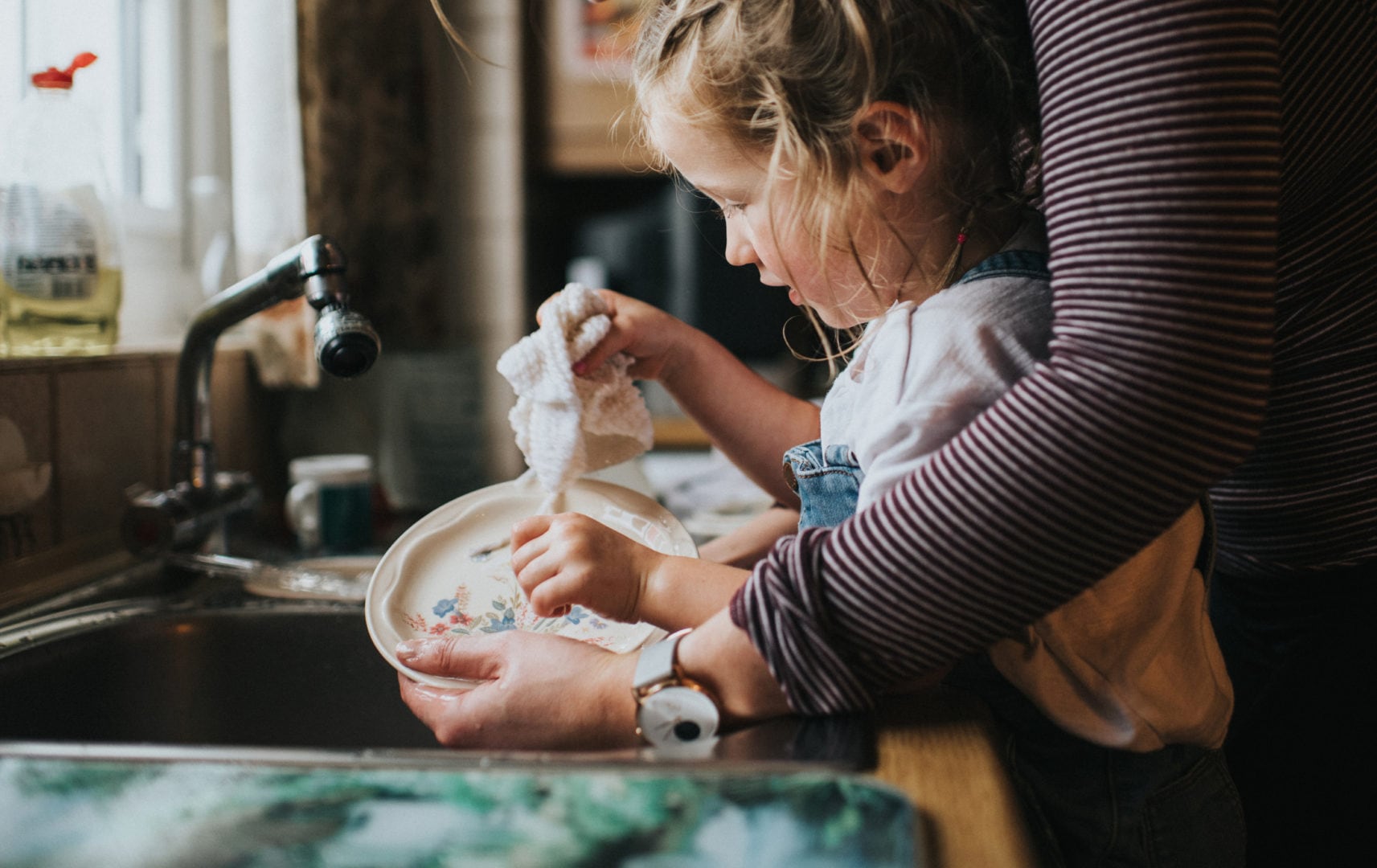No matter their age, involving kids in household to-dos can prove beneficial for both you and them. Susan Kuczmarski, author of “Becoming A Happy Family: Pathways to the Family Soul,” says chores help children foster a leadership skill called collective responsibility-taking. “As a member of the family group, they must help out and learn that their help is critical around the house and to it running smoothly,” she notes.
What’s more, pitching in on those common, daily mundane chores will also bolster their self-sufficiency, which sets kids up to do well in their academic, professional, and personal lives. Research proves it: One University of Minnesota study found that the best predictor of young adults’ success in their mid-20s was that they participated in household chores when they were three or four.
“As a member of the family group, they must help out and learn that their help is critical around the house and to it running smoothly.”
— Susan Kuczmarski, author, “Becoming a Happy Family”
That said, kids benefit most from chores that are age-appropriate. “You want a child to feel like they have done a good job and can keep doing the chore too,” says Kuczmarski. Here, age-appropriate chores for kids of all ages.
Chores kids can do: age-by-age guide
From cleaning up toys to grocery shopping, here’s a breakdown of chores by age for kids.
Chores for toddlers
Two or 3 is the perfect age to start chores, notes Kuczmarski. “Completing simple tasks makes young children feel capable and confident and helps their motor skills,” she says. “Toddlers love to help, so let them.”
1. Care for a pet
Kids are never too young to feel attachment and love for their pets, so they’ll be instantly invested in this task. “Teaching toddlers how to feed the pet, care for it and becoming educated on the pet’s needs is a well-rounded approach to chores, expanding education and teaching responsibilities,” says Wesley Oaks, dad of two and founder of Oddly Cute Pets. “I did this for my two kids with a pet frog, and they’ve both learned so much about amphibians and have become self-starters with their chores.”
2. Put dirty clothes in a hamper
Set up a basket in your child’s room, and make it a game by letting them throw in clothes from across the room.
3. Make their bed
Help your child pull the blanket over their bed and ask them to tuck in a stuffed animal to make it more fun.
4. Stack books
When you’ve finished reading afternoon stories, have your toddler gather the books into a pile or put them in a basket to keep things neat.
5. Get the diapers and wipes
Clap for your toddler when they grab these items, and it will be the perfect reward for them to complete. This — and any chore, really — instantly becomes more engaging for toddlers when parents give them tons of praise for helping out, says Sarah Heidi Pearlstein, a spokesperson for Abacus Early Learning Centers.
6. Stack plates
As you unload the dishwasher, toddlers can stack plates of different sizes, which can serve as a primer on ratios, suggests Michael Ungar, a family therapist and author of “Change Your World: The Science of Resilience and the True Path to Success.” Just like they do with blocks in school, they can use plates to learn how one object is twice as big as another or, even more simply, the idea of “big, bigger and biggest,” he notes.
7. Put away miscellaneous items
“One of the best chores for toddlers is putting away shoes, toys, and games” explains Pearlstein. “Straightening up gives toddlers a visual result so they can see how they are helping the household and making a difference. It also teaches them about taking care of their belongings and keeping their space organized and clean.”
“Straightening up gives toddlers a visual result so they can see how they are helping the household and making a difference …”
— Sarah Heidi Pearlstein, spokesperson, Abacus Early Learning Centers.

Chores for preschoolers
Between ages 3 and 5, a child will be eager to take on more responsibility, which gives them a sense of importance, says Lynell Ross, a life coach based in Auburn, California. Keeping things simple and fun will keep them motivated.
8. Set the table
Put the plates and cups out on the counter to serve as a reminder to your child that they need to set the table as a part of their chores.
9. Match and fold socks
Place all the socks in a large bin with their favorite TV show on and ask them to finish it before the episode is over. “Sorting laundry is great for learning the concept of ‘sets’ — not to mention expanding vocabulary regarding colors,” notes Ungar.
10. Simple meal prep
One of the most fun age-appropriate chores for kids — meal prep! Kids can take items out of the refrigerator, wash them in the sink while standing on a stool or very short chair, take the “cut-offs” or unused parts of a veggie or fruit and put them in the garbage container or wipe off the counter with a sponge, suggests Kuczmarski. “These tasks are suitable, because each is doable, if not easy to accomplish, so there will be no frustration,” she notes.
11. Clean windows and glass doors
Arm kids with cleaning spray and a towel, as well as parental supervision, and let them take the lead on making reflective surfaces throughout your home shine. “The younger they are, they will not have the coordination to wipe up every speck,” notes Ross. “The important thing is giving them a chance to practice.”
12. Pick weeds and rake leaves
Ross also advocates involving your preschooler in yardwork, which can contribute to developing their coordination, help them be physically active, and bolster a sense of importance.
13. Water the houseplants
If your child feels like the plants are theirs, they’ll be willing to help keep them alive. Sweeten the deal by investing in a real watering can instead of a plain drinking glass.
14. Put away shoes and coats
Add a photo of each child above a coat hook to designate a special spot just for them. Have their shoes go in the same place and remind your child when they get inside to put them away.
15. Unload the dishwasher
“My daughter loves to help me out by handing me clean items to put away,” says Evan Porter, dad of a 5-year-old girl and founder of Dad Fixes Everything. “We make up little songs about each item as we work. While it’s definitely faster when I do it alone, it’s a huge win to knock out a chore and bond with her at the same time.”
Chores for 6- to 10-year-olds
“These tasks help children feel like they are a part of the family, while learning life skills,” notes Ross. And avoid simply giving directions and walking away. Kids will be more engaged if you model each task, then participate to some degree alongside your child, says Ross. Then, give them plenty of praise for jobs well done and teach them ways to improve without criticizing.
16. Prepare a shopping list
This allows kids to apply math concepts by calculating the number of people in the household, what they eat, the number of days they need food and all the other aspects of food preparation, says Ungar.
17. Bake
Whether you’re preparing homemade bread for the week or spending a Sunday morning mixing up a treat to bring to a local food bank, involve your grade-schooler. “Baking and measuring ingredients is a wonderful way to learn everything from math to chemistry, as well as improve children’s literacy and vocabulary when following a recipe,” notes Ungar.
18. Sort more than socks
Allow your child to watch TV while they sort the family’s laundry or make it a reward to play on the iPad when they’re done.
19. Vacuum and mop floors
Post a chore chart with their task clearly labeled. Be sure they know how to use the tools and choose a vacuum and mop that aren’t too big for your kids.
20. Take out the garbage
Teach them how to tie the bag up and show them where to bring it. Consider giving your child a small weekly allowance if they’ve done all their chores for the week.
21. Clear the table
Set a little reward after they cleared the table, like being able to choose the TV show they watch before bed.
22. Load the dishwasher
Make sure your kids know how to put the dishes and glasses in each rack. Tell them how much you appreciate their help when they are done.
23. Walk the dog
While they may have overseen the feeding of the family pet at a younger age, you can consider this the next level of pet care for older, more independent children.
Chores for tweens & teens
“Preteens and teens are capable of helping with almost any type of housework and yard work,” says Ross. “But as kids get older, they might not be so happy to help with their chores. However, if you have regular family meetings once per week, you can explain that you all need to pull together as a family. Tell them that you are a team, and everyone has a part to play.”
You can also steer them toward chores that they’ll undoubtedly need to tackle once they’re on their own in college and beyond. “As a rule of thumb, 16- to 18-year-olds should be able to do everything that adults can,” says Kuczmarski.
24. Clean the bathrooms
No one likes to scrub toilets, but it’s also a crucial life skill they can take with them into adulthood.
25. Do laundry
Another must-know for any kid leaving the nest, according to Kuczmarski, as it’s a basic adult life skill.
26. Shop for groceries
Your tween could handle the process of putting in a delivery order on Instacart from start to finish, while a teen could head to the store themselves. Either way, enlisting your adolescent for grocery shopping duties can help make them more financially responsible, notes Kuczmarski.
27. Prepare meals
Your adolescent can pitch in by washing fruits and vegetables, mixing, stirring, and chopping produce with close supervision, says Ross.
The importance of chores for kids
“For kids of all ages, performing chores is vital to building self-esteem, teaching them important life skills and helping them feel that they belong,” points out Ross. Guide them positively, and they’ll be prepared for a variety of curveballs they might encounter down the road.




